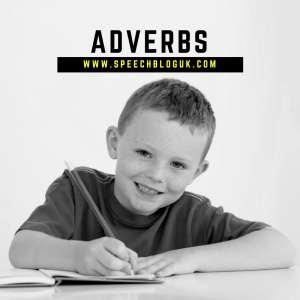You often find that children will develop expressive language to the point where they can produce short sentences e.g. The man is running, the lady is brushing her teeth. However they find it harder to develop longer, more complex sentences and vocabulary. They often need these areas to be specifically taught.

As early as year 2 in UK schools, children are now expected to use a range of adjectives and adverbs as well as knowing what that means and where in the sentence they go! They should of course already know what verbs are and be able to generate a good range of them. Once they are in Junior school they have to know all about fronted adverbials and embedded clauses!
You can’t teach these harder areas unless the child has a good understanding of the basics. So before I teach adverbs, I will check that the child can identify and improve verbs in sentences and also understands what adjectives are and where they go.
I teach that adverbs “add to the verb” and concentrate on the -ly words that go with the verb e.g. quickly, hungrily etc. I find this is a good starting place. However, adverbs are not this simple. They can also describe place, time, frequency, certainty and more. They can be used in a few different positions in a sentence as well. But we have to start somewhere!
- If the child likes acting, you could pick a basic verb such as walk and then act out walking in the style of different adverbs. Write out some simple -ly adverbs on cards and get the child to pick a card and act it out. This is a great group activity. The other children can try and guess how the child is walking – is it slowly or carefully? Quietly or rapidly?
- Write a simple sentence and see how many adverbs the child can think of to fit the sentence. For example “The boy is eating the ice-cream” – he could be doing this hungrily, greedily, quickly, carefully etc
- If the child finds it hard to think of adverbs on their own, try giving them options for a sentence and see if they can tell you if it would work or not. If our sentence was about someone running, could they be running carefully? – yes, could they be running greedily? – not really!
- Try to use them in everyday situations. Look at what people are doing and see if you and your child together can think of adverbs to describe how they are doing things. e.g. That girl is skipping happily or the children are playing enthusiastically.
- Children’s story books use some great language. You could read through a favourite book together and look for adverbs. This will help increase the child’s range of adverbs and you can also discuss how the adverbs improve the story.
- One of our favourite resource books – Rhodes to Language has some great game ideas!
- If the child uses an adverb when they are talking, remember to praise them!
What other ways do you practise adverbs?






Leave a Reply